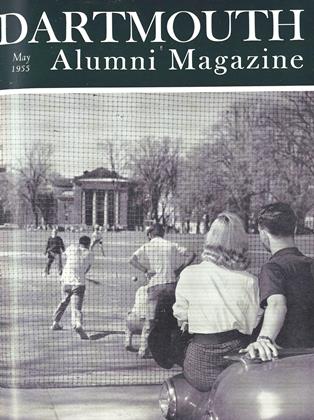THOUGH I hope to write to many individually I want to thank at this time some of those alumni and others who made my. Western trip late in the winter so pleasant and profitable. Books were discussed with some; with others, the affairs of the College; painting was the subject with Guy Wallick '21 and Otto Karl Bach '31. The doings of "The Friends" were a constant source of interest among many I saw.
For all the pleasant excursions, dinners and lunches; for the beautiful drive to San Diego with Bob Morris '36; for the thrilling flight up the Columbia River Gorge over the Bonneville Dam in Oregon with Dr. Charles Mills '34; for the luncheon at the Stock Exchange Club in San Francisco arranged by Joseph Bransten; for the generous hospitality of Georgie and Harry Van de Kamp and for the visit to Harry James in the San Jacinto Mountains; for their bounteous hospitality and the drive to Mt. Wilson and the Mojave Desert with Paul and Dorry Bowerman in Sierra Madre; for the hospitality of the incomparable Dr. Harold Bradley in Berkeley; for the kindness of Hart Gilchrist, Neil Roberts, and Mr. and Mrs. Everett Parker in Denver; for all these happy experiences and good friends, many thanks.
Thanks, too, to George Keating of Los Altos, all the Executive Committee and Friends of the Dartmouth Library I was able to visit, to Carl I. Wheat, Robert O. Schad, Perc S. Brown, Eric Hessler '42, Joseph Henry Jackson, Rudy Pacht '35, Leon Rothschild '24, Mary and Harry Ackerman '35, Bill Knibbs '34, David Magee, bookseller extraordinary, Clyde and Mary Jensen '22 in Seattle, Paul and Dorothy Cutler '24 in Wilmette, Tom Beers '34 in Winnetka, and others too numerous to mention.
Howard Rea, of Denver, recommended to me Thurman Arnold's Folklore of Capitalism, which he had recently re-read, and another book, Symbols of Government. Dorothy Poole, wife of John H. Poole '34, of Pasadena, urged me to read Langford's Education and the Social Conflict, Bramell's Design for America, and Mark van Doren's Liberal Education. Dave Gallagher '35, with whom I had lunch in Colorado Springs, gave me Sprague's interesting story of Cripple Creek: MoneyMountain. This I can recommend to all lovers of Westerniana, as well as TheLife and Adventures of Joaquin Murieta, introduced by Joseph Henry Jackson, TheShirley Letters, introduced by the charming collector and scholar, Carl I. Wheat. Harry Robertson of Tarzana gave me Gertrude Atherton's Rezanov, that tragic story of early San Francisco (I later saw Concha's house, which is now an officers' club in the Presidio). Other Western books read on the way were John Muir's The Mountains of California, first published in 1894, and three original narratives edited by the head of the Huntington Library, John E. Pomfret, called California Gold Rush Narratives. I must have read at least fifty overland journals, many in manuscript, but with these I hope to deal later in a book.
Mrs. Fred Shanaman gave me a copy of Marquand's Sincerely, Willis Wayde, which, if not Grade A Marquand, has its good spots. I can also sing the praises of Will Ready's The Great Disciple and otherStories.
Emily Hahn, intriguing writer on China, has now written a full-length study of Chiang Kai-shek, a most controversial figure on the world scene. Some think of Chiang as a Christian crusader (Knowland and Bridges), others regard him as a bloodthirsty fascist, a dangerous radical, a gallant ally: contradictions which blur the picture. Emily Hahn has found the truth in neither extreme: Chiang is Chiang - consistent, faithful to his principles, brave, narrow, and above all, stubborn. The author traces his career from a junior officer to top command, describes those fabulous incidents in his life such as his punitive expedition to the north; his skillful avoidance of fatal conflicts with Russia and Japan while managing to control the malcontents in his own regime; his "kidnaping" in Sian; his war with the Communists and his retreat to Formosa.
The book ends: "What Chiang hopes for is to return to the mainland. If during the attack to attain this he should lose his life - well, that Bushido spirit he toasted in water, long ago in Takata, still holds good."
All I can personally hope for is that he doesn't take thousands of American lives with him. To die for America is one thing; to die for Chiang, the Kuomintang and the China Lobby, is quite another.
I was also interested in Van Wyck Brooks' book: John Sloan: A Painter'sLife, and especially the last chapter, which used in part some of my own brochure: John Sloan's Last Summer, 1952.
John Sloan was an even greater man than he was artist, and this, considering the pictures of his best years, is high praise indeed. Dartmouth is the fortunate possessor of several of Sloan's better paintings, as well as some of his diaries, and other memorabilia well worth reading.
 View Full Issue
View Full Issue
More From This Issue
-
 Feature
FeatureEVEN DISAGREEING WITH HIM WAS PLEASANT
May 1955 By ARTHUR H. LORD '10 -
 Feature
FeatureThe Life of the Mind
May 1955 By DR. ALAN GREGG, -
 Feature
FeatureFreedom and Discipline
May 1955 By AMOS N. BLANDIN JR. 18 -
 Feature
FeatureThe Education of a Freshman
May 1955 -
 Class Notes
Class Notes1918
May 1955 By ERNEST H. EARLEY, RICHARD A. HOLTON -
 Article
ArticleThe Undergraduate Chair
May 1955 By G. H. CASSELS-SMITH '55
HERBERT F. WEST '22
-
 Article
ArticleHanover Browsing
May 1941 By HERBERT F. WEST '22 -
 Books
BooksPEPPERFOOT OF THURSDAY MARKET
June 1941 By Herbert F. West '22 -
 Article
ArticleHanover Browsing
February 1943 By HERBERT F. WEST '22 -
 Article
ArticleHanover Browsing
December 1951 By HERBERT F. WEST '22 -
 Article
ArticleHanover Browsing
March 1952 By HERBERT F. WEST '22 -
 Article
ArticleHanover Browsing
March 1958 By HERBERT F. WEST '22








